Evaluating Contractual Promises: The Impact of Williams v Roffey Bros
VerifiedAdded on 2023/04/21
|10
|2645
|323
Essay
AI Summary
This essay critically examines the decision in Williams v Roffey Bros, focusing on whether courts prioritize technical considerations or principles of fairness, reasonableness, and commercial utility when enforcing contractual promises. It begins by explaining the traditional principle of consideration as seen in Stilk v Myrick, which emphasizes pre-existing duties, and contrasts it with the practical benefit test introduced in Williams v Roffey Bros. The essay discusses how the Roffey Bros case challenged traditional principles by suggesting that performing an existing duty can constitute good consideration if it provides a practical benefit or avoids a disbenefit to the other party. It also addresses criticisms and conflicts arising from the Roffey Bros decision, particularly its inconsistency with Foakes v. Beer, which held that part-payment of a debt is not sufficient consideration. The essay further explores how different courts have approached these conflicting precedents, noting that some courts have been hesitant to fully embrace the Roffey Bros principle due to its potential to undermine the Foakes v. Beer ruling. Ultimately, the essay evaluates whether the focus has shifted from technical consideration to broader questions of fairness and commercial utility, referencing cases like Re Selectmove Ltd to illustrate the ongoing debate and varying judicial interpretations.
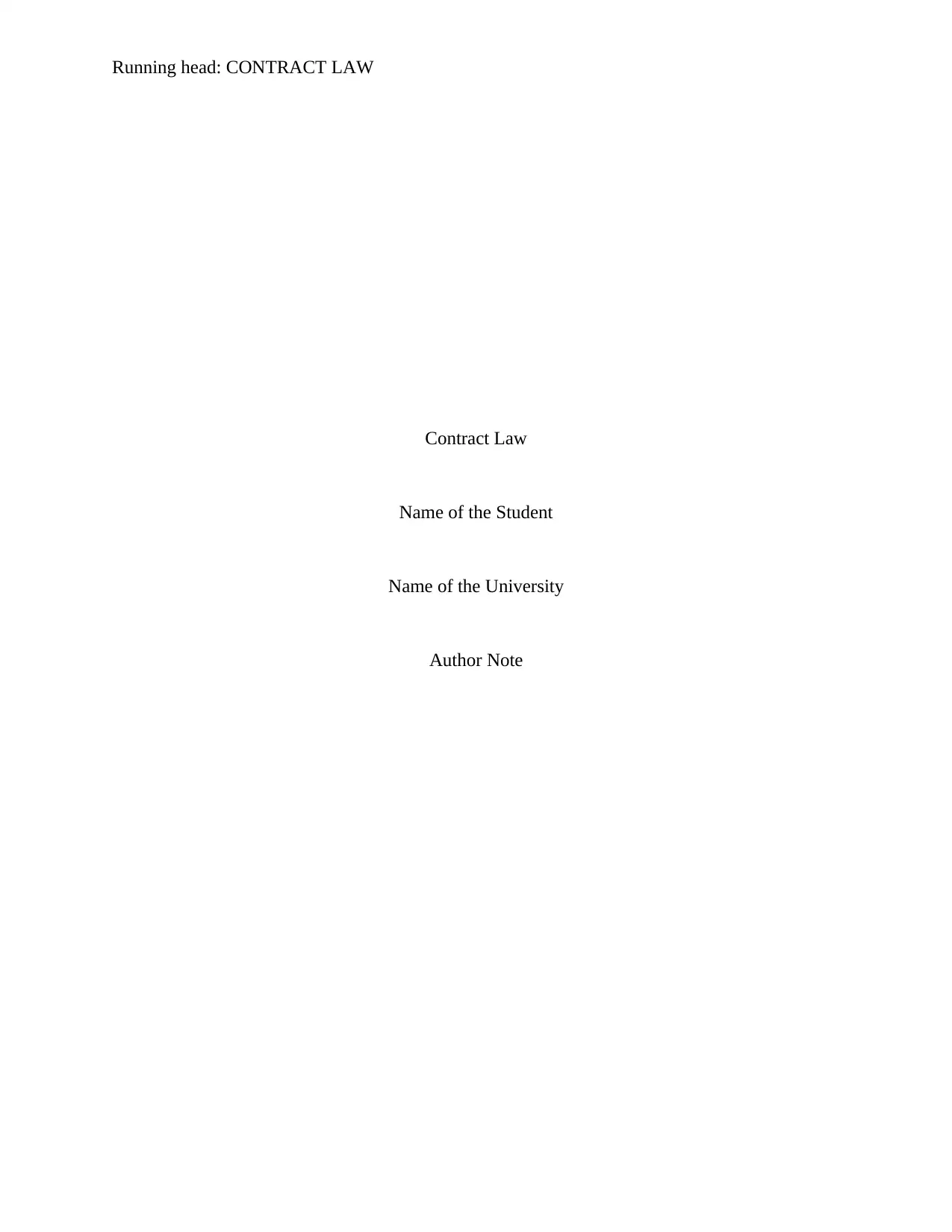
Running head: CONTRACT LAW
Contract Law
Name of the Student
Name of the University
Author Note
Contract Law
Name of the Student
Name of the University
Author Note
Paraphrase This Document
Need a fresh take? Get an instant paraphrase of this document with our AI Paraphraser
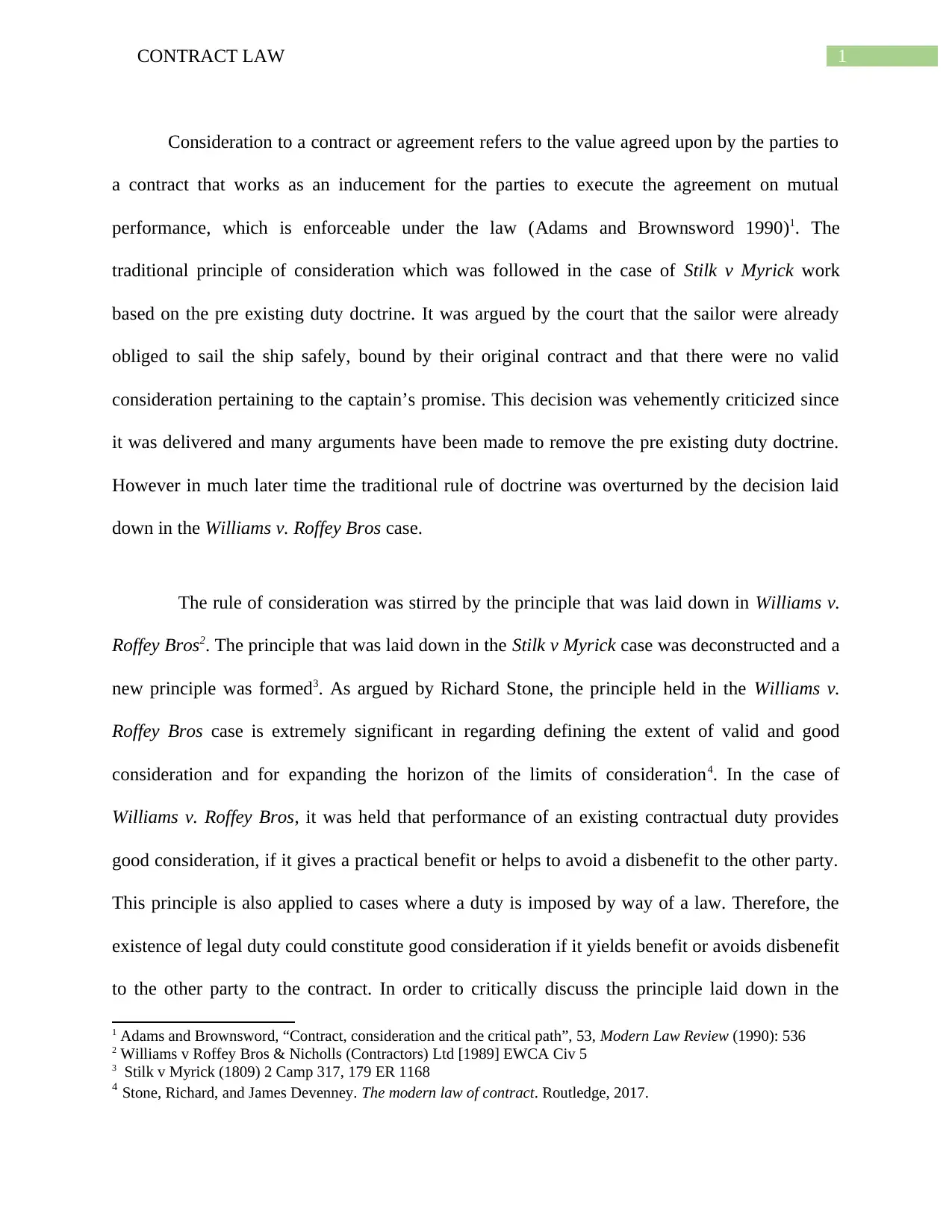
1CONTRACT LAW
Consideration to a contract or agreement refers to the value agreed upon by the parties to
a contract that works as an inducement for the parties to execute the agreement on mutual
performance, which is enforceable under the law (Adams and Brownsword 1990)1. The
traditional principle of consideration which was followed in the case of Stilk v Myrick work
based on the pre existing duty doctrine. It was argued by the court that the sailor were already
obliged to sail the ship safely, bound by their original contract and that there were no valid
consideration pertaining to the captain’s promise. This decision was vehemently criticized since
it was delivered and many arguments have been made to remove the pre existing duty doctrine.
However in much later time the traditional rule of doctrine was overturned by the decision laid
down in the Williams v. Roffey Bros case.
The rule of consideration was stirred by the principle that was laid down in Williams v.
Roffey Bros2. The principle that was laid down in the Stilk v Myrick case was deconstructed and a
new principle was formed3. As argued by Richard Stone, the principle held in the Williams v.
Roffey Bros case is extremely significant in regarding defining the extent of valid and good
consideration and for expanding the horizon of the limits of consideration4. In the case of
Williams v. Roffey Bros, it was held that performance of an existing contractual duty provides
good consideration, if it gives a practical benefit or helps to avoid a disbenefit to the other party.
This principle is also applied to cases where a duty is imposed by way of a law. Therefore, the
existence of legal duty could constitute good consideration if it yields benefit or avoids disbenefit
to the other party to the contract. In order to critically discuss the principle laid down in the
1 Adams and Brownsword, “Contract, consideration and the critical path”, 53, Modern Law Review (1990): 536
2 Williams v Roffey Bros & Nicholls (Contractors) Ltd [1989] EWCA Civ 5
3 Stilk v Myrick (1809) 2 Camp 317, 179 ER 1168
4 Stone, Richard, and James Devenney. The modern law of contract. Routledge, 2017.
Consideration to a contract or agreement refers to the value agreed upon by the parties to
a contract that works as an inducement for the parties to execute the agreement on mutual
performance, which is enforceable under the law (Adams and Brownsword 1990)1. The
traditional principle of consideration which was followed in the case of Stilk v Myrick work
based on the pre existing duty doctrine. It was argued by the court that the sailor were already
obliged to sail the ship safely, bound by their original contract and that there were no valid
consideration pertaining to the captain’s promise. This decision was vehemently criticized since
it was delivered and many arguments have been made to remove the pre existing duty doctrine.
However in much later time the traditional rule of doctrine was overturned by the decision laid
down in the Williams v. Roffey Bros case.
The rule of consideration was stirred by the principle that was laid down in Williams v.
Roffey Bros2. The principle that was laid down in the Stilk v Myrick case was deconstructed and a
new principle was formed3. As argued by Richard Stone, the principle held in the Williams v.
Roffey Bros case is extremely significant in regarding defining the extent of valid and good
consideration and for expanding the horizon of the limits of consideration4. In the case of
Williams v. Roffey Bros, it was held that performance of an existing contractual duty provides
good consideration, if it gives a practical benefit or helps to avoid a disbenefit to the other party.
This principle is also applied to cases where a duty is imposed by way of a law. Therefore, the
existence of legal duty could constitute good consideration if it yields benefit or avoids disbenefit
to the other party to the contract. In order to critically discuss the principle laid down in the
1 Adams and Brownsword, “Contract, consideration and the critical path”, 53, Modern Law Review (1990): 536
2 Williams v Roffey Bros & Nicholls (Contractors) Ltd [1989] EWCA Civ 5
3 Stilk v Myrick (1809) 2 Camp 317, 179 ER 1168
4 Stone, Richard, and James Devenney. The modern law of contract. Routledge, 2017.
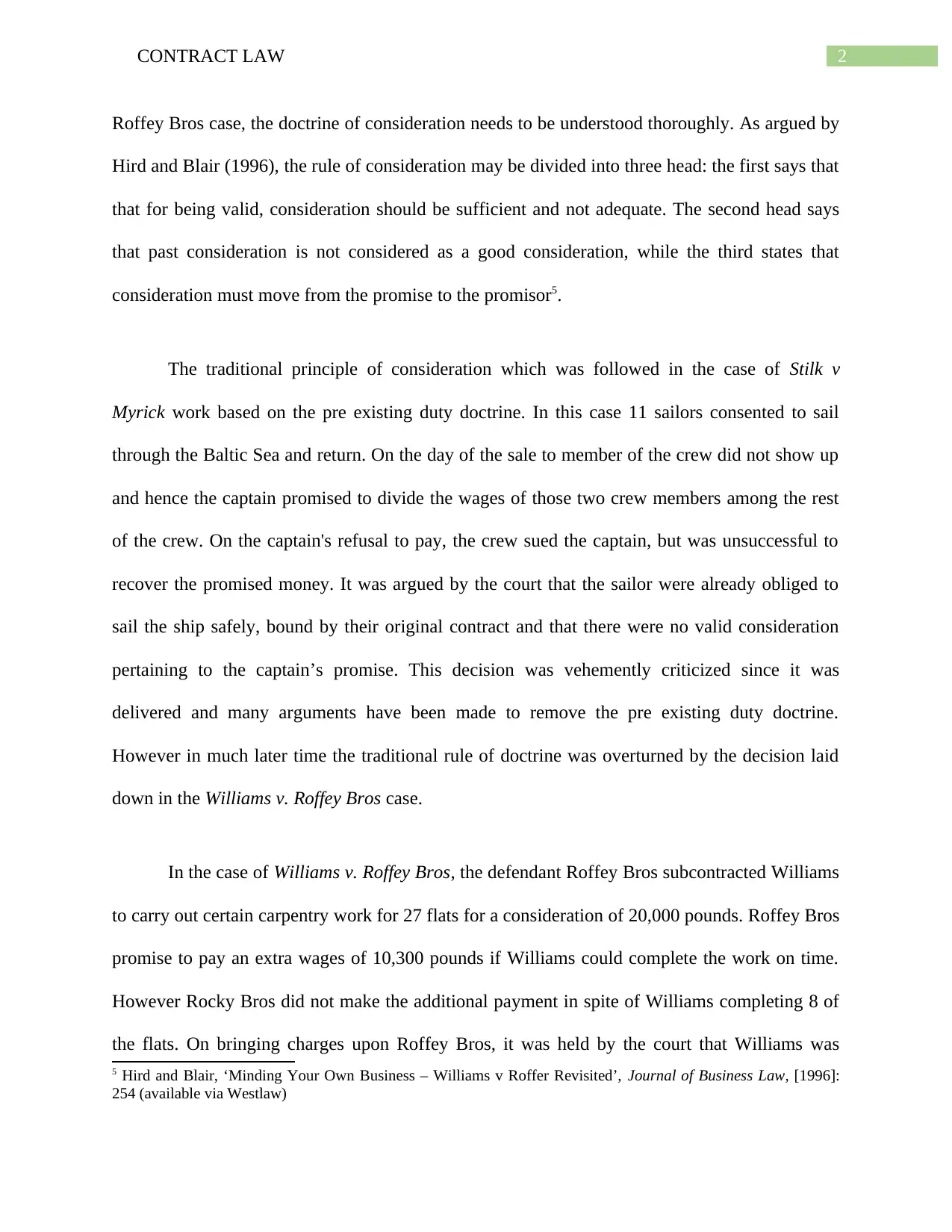
2CONTRACT LAW
Roffey Bros case, the doctrine of consideration needs to be understood thoroughly. As argued by
Hird and Blair (1996), the rule of consideration may be divided into three head: the first says that
that for being valid, consideration should be sufficient and not adequate. The second head says
that past consideration is not considered as a good consideration, while the third states that
consideration must move from the promise to the promisor5.
The traditional principle of consideration which was followed in the case of Stilk v
Myrick work based on the pre existing duty doctrine. In this case 11 sailors consented to sail
through the Baltic Sea and return. On the day of the sale to member of the crew did not show up
and hence the captain promised to divide the wages of those two crew members among the rest
of the crew. On the captain's refusal to pay, the crew sued the captain, but was unsuccessful to
recover the promised money. It was argued by the court that the sailor were already obliged to
sail the ship safely, bound by their original contract and that there were no valid consideration
pertaining to the captain’s promise. This decision was vehemently criticized since it was
delivered and many arguments have been made to remove the pre existing duty doctrine.
However in much later time the traditional rule of doctrine was overturned by the decision laid
down in the Williams v. Roffey Bros case.
In the case of Williams v. Roffey Bros, the defendant Roffey Bros subcontracted Williams
to carry out certain carpentry work for 27 flats for a consideration of 20,000 pounds. Roffey Bros
promise to pay an extra wages of 10,300 pounds if Williams could complete the work on time.
However Rocky Bros did not make the additional payment in spite of Williams completing 8 of
the flats. On bringing charges upon Roffey Bros, it was held by the court that Williams was
5 Hird and Blair, ‘Minding Your Own Business – Williams v Roffer Revisited’, Journal of Business Law, [1996]:
254 (available via Westlaw)
Roffey Bros case, the doctrine of consideration needs to be understood thoroughly. As argued by
Hird and Blair (1996), the rule of consideration may be divided into three head: the first says that
that for being valid, consideration should be sufficient and not adequate. The second head says
that past consideration is not considered as a good consideration, while the third states that
consideration must move from the promise to the promisor5.
The traditional principle of consideration which was followed in the case of Stilk v
Myrick work based on the pre existing duty doctrine. In this case 11 sailors consented to sail
through the Baltic Sea and return. On the day of the sale to member of the crew did not show up
and hence the captain promised to divide the wages of those two crew members among the rest
of the crew. On the captain's refusal to pay, the crew sued the captain, but was unsuccessful to
recover the promised money. It was argued by the court that the sailor were already obliged to
sail the ship safely, bound by their original contract and that there were no valid consideration
pertaining to the captain’s promise. This decision was vehemently criticized since it was
delivered and many arguments have been made to remove the pre existing duty doctrine.
However in much later time the traditional rule of doctrine was overturned by the decision laid
down in the Williams v. Roffey Bros case.
In the case of Williams v. Roffey Bros, the defendant Roffey Bros subcontracted Williams
to carry out certain carpentry work for 27 flats for a consideration of 20,000 pounds. Roffey Bros
promise to pay an extra wages of 10,300 pounds if Williams could complete the work on time.
However Rocky Bros did not make the additional payment in spite of Williams completing 8 of
the flats. On bringing charges upon Roffey Bros, it was held by the court that Williams was
5 Hird and Blair, ‘Minding Your Own Business – Williams v Roffer Revisited’, Journal of Business Law, [1996]:
254 (available via Westlaw)
⊘ This is a preview!⊘
Do you want full access?
Subscribe today to unlock all pages.

Trusted by 1+ million students worldwide
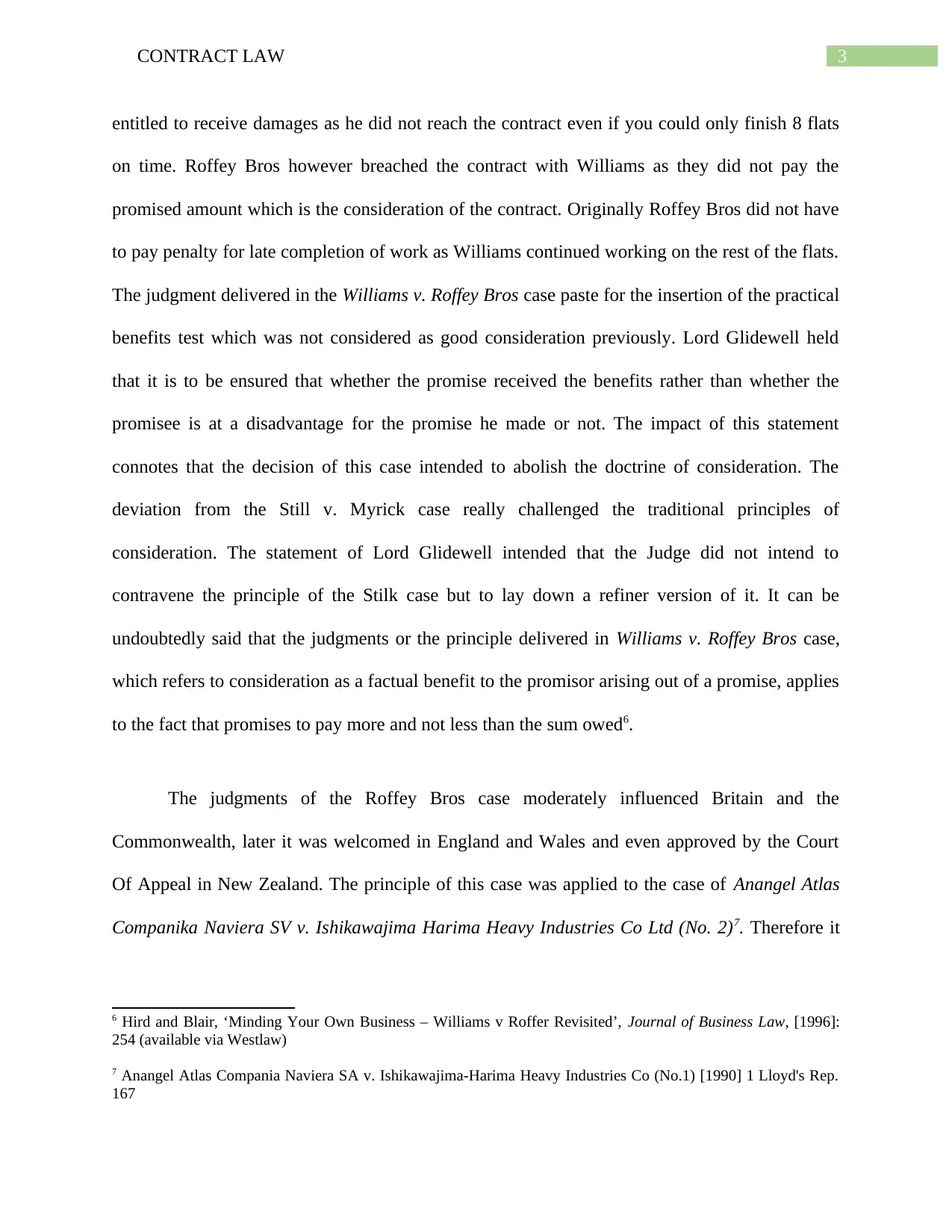
3CONTRACT LAW
entitled to receive damages as he did not reach the contract even if you could only finish 8 flats
on time. Roffey Bros however breached the contract with Williams as they did not pay the
promised amount which is the consideration of the contract. Originally Roffey Bros did not have
to pay penalty for late completion of work as Williams continued working on the rest of the flats.
The judgment delivered in the Williams v. Roffey Bros case paste for the insertion of the practical
benefits test which was not considered as good consideration previously. Lord Glidewell held
that it is to be ensured that whether the promise received the benefits rather than whether the
promisee is at a disadvantage for the promise he made or not. The impact of this statement
connotes that the decision of this case intended to abolish the doctrine of consideration. The
deviation from the Still v. Myrick case really challenged the traditional principles of
consideration. The statement of Lord Glidewell intended that the Judge did not intend to
contravene the principle of the Stilk case but to lay down a refiner version of it. It can be
undoubtedly said that the judgments or the principle delivered in Williams v. Roffey Bros case,
which refers to consideration as a factual benefit to the promisor arising out of a promise, applies
to the fact that promises to pay more and not less than the sum owed6.
The judgments of the Roffey Bros case moderately influenced Britain and the
Commonwealth, later it was welcomed in England and Wales and even approved by the Court
Of Appeal in New Zealand. The principle of this case was applied to the case of Anangel Atlas
Companika Naviera SV v. Ishikawajima Harima Heavy Industries Co Ltd (No. 2)7. Therefore it
6 Hird and Blair, ‘Minding Your Own Business – Williams v Roffer Revisited’, Journal of Business Law, [1996]:
254 (available via Westlaw)
7 Anangel Atlas Compania Naviera SA v. Ishikawajima-Harima Heavy Industries Co (No.1) [1990] 1 Lloyd's Rep.
167
entitled to receive damages as he did not reach the contract even if you could only finish 8 flats
on time. Roffey Bros however breached the contract with Williams as they did not pay the
promised amount which is the consideration of the contract. Originally Roffey Bros did not have
to pay penalty for late completion of work as Williams continued working on the rest of the flats.
The judgment delivered in the Williams v. Roffey Bros case paste for the insertion of the practical
benefits test which was not considered as good consideration previously. Lord Glidewell held
that it is to be ensured that whether the promise received the benefits rather than whether the
promisee is at a disadvantage for the promise he made or not. The impact of this statement
connotes that the decision of this case intended to abolish the doctrine of consideration. The
deviation from the Still v. Myrick case really challenged the traditional principles of
consideration. The statement of Lord Glidewell intended that the Judge did not intend to
contravene the principle of the Stilk case but to lay down a refiner version of it. It can be
undoubtedly said that the judgments or the principle delivered in Williams v. Roffey Bros case,
which refers to consideration as a factual benefit to the promisor arising out of a promise, applies
to the fact that promises to pay more and not less than the sum owed6.
The judgments of the Roffey Bros case moderately influenced Britain and the
Commonwealth, later it was welcomed in England and Wales and even approved by the Court
Of Appeal in New Zealand. The principle of this case was applied to the case of Anangel Atlas
Companika Naviera SV v. Ishikawajima Harima Heavy Industries Co Ltd (No. 2)7. Therefore it
6 Hird and Blair, ‘Minding Your Own Business – Williams v Roffer Revisited’, Journal of Business Law, [1996]:
254 (available via Westlaw)
7 Anangel Atlas Compania Naviera SA v. Ishikawajima-Harima Heavy Industries Co (No.1) [1990] 1 Lloyd's Rep.
167
Paraphrase This Document
Need a fresh take? Get an instant paraphrase of this document with our AI Paraphraser
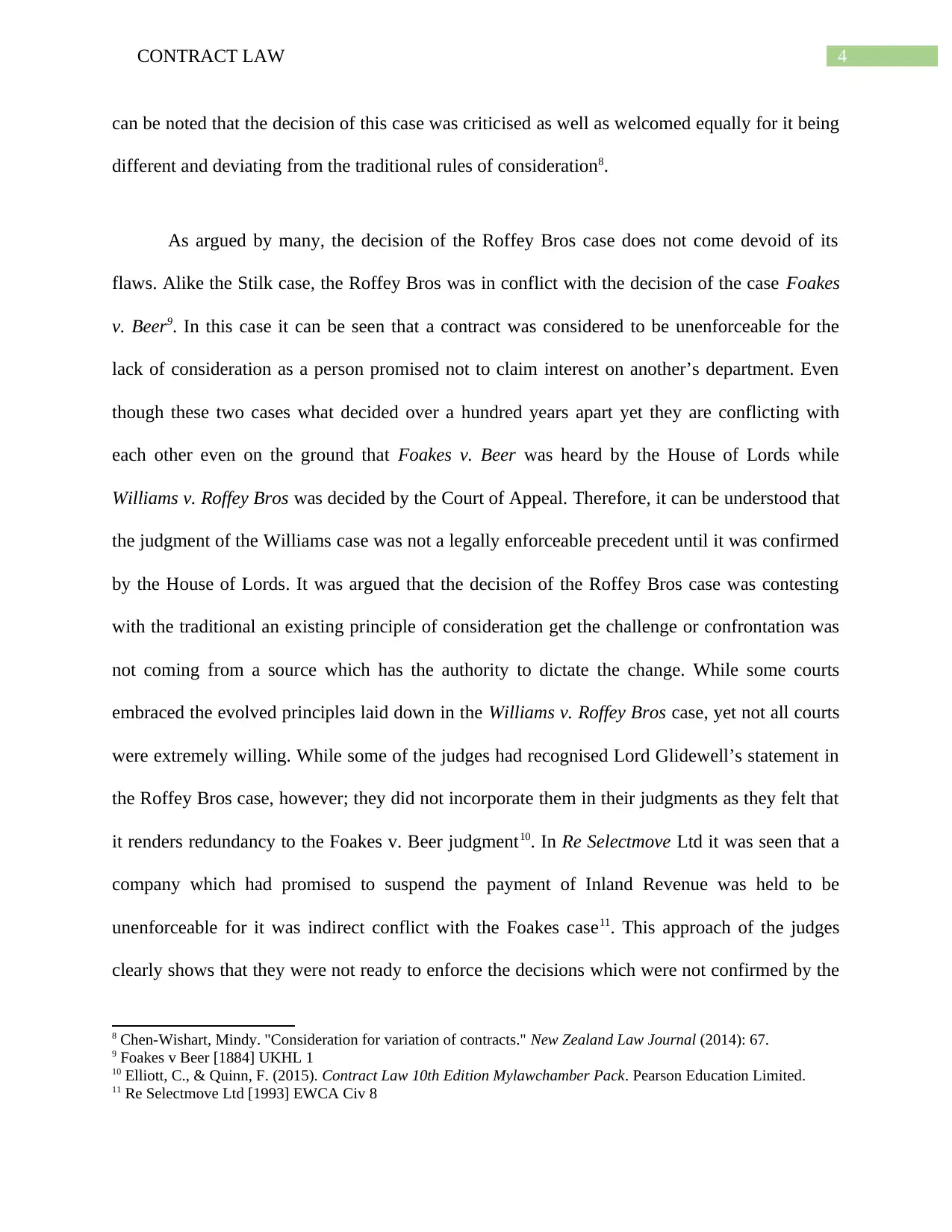
4CONTRACT LAW
can be noted that the decision of this case was criticised as well as welcomed equally for it being
different and deviating from the traditional rules of consideration8.
As argued by many, the decision of the Roffey Bros case does not come devoid of its
flaws. Alike the Stilk case, the Roffey Bros was in conflict with the decision of the case Foakes
v. Beer9. In this case it can be seen that a contract was considered to be unenforceable for the
lack of consideration as a person promised not to claim interest on another’s department. Even
though these two cases what decided over a hundred years apart yet they are conflicting with
each other even on the ground that Foakes v. Beer was heard by the House of Lords while
Williams v. Roffey Bros was decided by the Court of Appeal. Therefore, it can be understood that
the judgment of the Williams case was not a legally enforceable precedent until it was confirmed
by the House of Lords. It was argued that the decision of the Roffey Bros case was contesting
with the traditional an existing principle of consideration get the challenge or confrontation was
not coming from a source which has the authority to dictate the change. While some courts
embraced the evolved principles laid down in the Williams v. Roffey Bros case, yet not all courts
were extremely willing. While some of the judges had recognised Lord Glidewell’s statement in
the Roffey Bros case, however; they did not incorporate them in their judgments as they felt that
it renders redundancy to the Foakes v. Beer judgment10. In Re Selectmove Ltd it was seen that a
company which had promised to suspend the payment of Inland Revenue was held to be
unenforceable for it was indirect conflict with the Foakes case11. This approach of the judges
clearly shows that they were not ready to enforce the decisions which were not confirmed by the
8 Chen-Wishart, Mindy. "Consideration for variation of contracts." New Zealand Law Journal (2014): 67.
9 Foakes v Beer [1884] UKHL 1
10 Elliott, C., & Quinn, F. (2015). Contract Law 10th Edition Mylawchamber Pack. Pearson Education Limited.
11 Re Selectmove Ltd [1993] EWCA Civ 8
can be noted that the decision of this case was criticised as well as welcomed equally for it being
different and deviating from the traditional rules of consideration8.
As argued by many, the decision of the Roffey Bros case does not come devoid of its
flaws. Alike the Stilk case, the Roffey Bros was in conflict with the decision of the case Foakes
v. Beer9. In this case it can be seen that a contract was considered to be unenforceable for the
lack of consideration as a person promised not to claim interest on another’s department. Even
though these two cases what decided over a hundred years apart yet they are conflicting with
each other even on the ground that Foakes v. Beer was heard by the House of Lords while
Williams v. Roffey Bros was decided by the Court of Appeal. Therefore, it can be understood that
the judgment of the Williams case was not a legally enforceable precedent until it was confirmed
by the House of Lords. It was argued that the decision of the Roffey Bros case was contesting
with the traditional an existing principle of consideration get the challenge or confrontation was
not coming from a source which has the authority to dictate the change. While some courts
embraced the evolved principles laid down in the Williams v. Roffey Bros case, yet not all courts
were extremely willing. While some of the judges had recognised Lord Glidewell’s statement in
the Roffey Bros case, however; they did not incorporate them in their judgments as they felt that
it renders redundancy to the Foakes v. Beer judgment10. In Re Selectmove Ltd it was seen that a
company which had promised to suspend the payment of Inland Revenue was held to be
unenforceable for it was indirect conflict with the Foakes case11. This approach of the judges
clearly shows that they were not ready to enforce the decisions which were not confirmed by the
8 Chen-Wishart, Mindy. "Consideration for variation of contracts." New Zealand Law Journal (2014): 67.
9 Foakes v Beer [1884] UKHL 1
10 Elliott, C., & Quinn, F. (2015). Contract Law 10th Edition Mylawchamber Pack. Pearson Education Limited.
11 Re Selectmove Ltd [1993] EWCA Civ 8
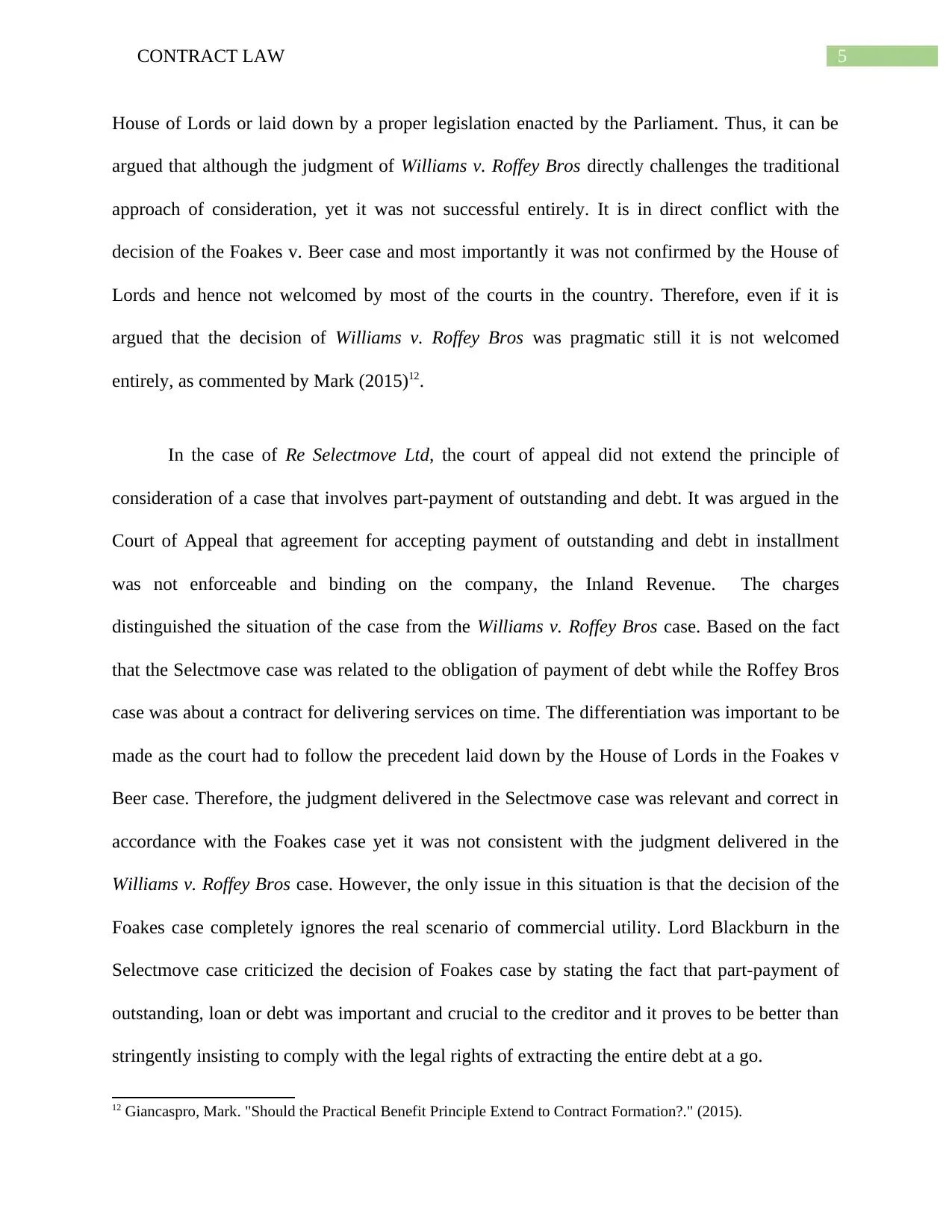
5CONTRACT LAW
House of Lords or laid down by a proper legislation enacted by the Parliament. Thus, it can be
argued that although the judgment of Williams v. Roffey Bros directly challenges the traditional
approach of consideration, yet it was not successful entirely. It is in direct conflict with the
decision of the Foakes v. Beer case and most importantly it was not confirmed by the House of
Lords and hence not welcomed by most of the courts in the country. Therefore, even if it is
argued that the decision of Williams v. Roffey Bros was pragmatic still it is not welcomed
entirely, as commented by Mark (2015)12.
In the case of Re Selectmove Ltd, the court of appeal did not extend the principle of
consideration of a case that involves part-payment of outstanding and debt. It was argued in the
Court of Appeal that agreement for accepting payment of outstanding and debt in installment
was not enforceable and binding on the company, the Inland Revenue. The charges
distinguished the situation of the case from the Williams v. Roffey Bros case. Based on the fact
that the Selectmove case was related to the obligation of payment of debt while the Roffey Bros
case was about a contract for delivering services on time. The differentiation was important to be
made as the court had to follow the precedent laid down by the House of Lords in the Foakes v
Beer case. Therefore, the judgment delivered in the Selectmove case was relevant and correct in
accordance with the Foakes case yet it was not consistent with the judgment delivered in the
Williams v. Roffey Bros case. However, the only issue in this situation is that the decision of the
Foakes case completely ignores the real scenario of commercial utility. Lord Blackburn in the
Selectmove case criticized the decision of Foakes case by stating the fact that part-payment of
outstanding, loan or debt was important and crucial to the creditor and it proves to be better than
stringently insisting to comply with the legal rights of extracting the entire debt at a go.
12 Giancaspro, Mark. "Should the Practical Benefit Principle Extend to Contract Formation?." (2015).
House of Lords or laid down by a proper legislation enacted by the Parliament. Thus, it can be
argued that although the judgment of Williams v. Roffey Bros directly challenges the traditional
approach of consideration, yet it was not successful entirely. It is in direct conflict with the
decision of the Foakes v. Beer case and most importantly it was not confirmed by the House of
Lords and hence not welcomed by most of the courts in the country. Therefore, even if it is
argued that the decision of Williams v. Roffey Bros was pragmatic still it is not welcomed
entirely, as commented by Mark (2015)12.
In the case of Re Selectmove Ltd, the court of appeal did not extend the principle of
consideration of a case that involves part-payment of outstanding and debt. It was argued in the
Court of Appeal that agreement for accepting payment of outstanding and debt in installment
was not enforceable and binding on the company, the Inland Revenue. The charges
distinguished the situation of the case from the Williams v. Roffey Bros case. Based on the fact
that the Selectmove case was related to the obligation of payment of debt while the Roffey Bros
case was about a contract for delivering services on time. The differentiation was important to be
made as the court had to follow the precedent laid down by the House of Lords in the Foakes v
Beer case. Therefore, the judgment delivered in the Selectmove case was relevant and correct in
accordance with the Foakes case yet it was not consistent with the judgment delivered in the
Williams v. Roffey Bros case. However, the only issue in this situation is that the decision of the
Foakes case completely ignores the real scenario of commercial utility. Lord Blackburn in the
Selectmove case criticized the decision of Foakes case by stating the fact that part-payment of
outstanding, loan or debt was important and crucial to the creditor and it proves to be better than
stringently insisting to comply with the legal rights of extracting the entire debt at a go.
12 Giancaspro, Mark. "Should the Practical Benefit Principle Extend to Contract Formation?." (2015).
⊘ This is a preview!⊘
Do you want full access?
Subscribe today to unlock all pages.

Trusted by 1+ million students worldwide
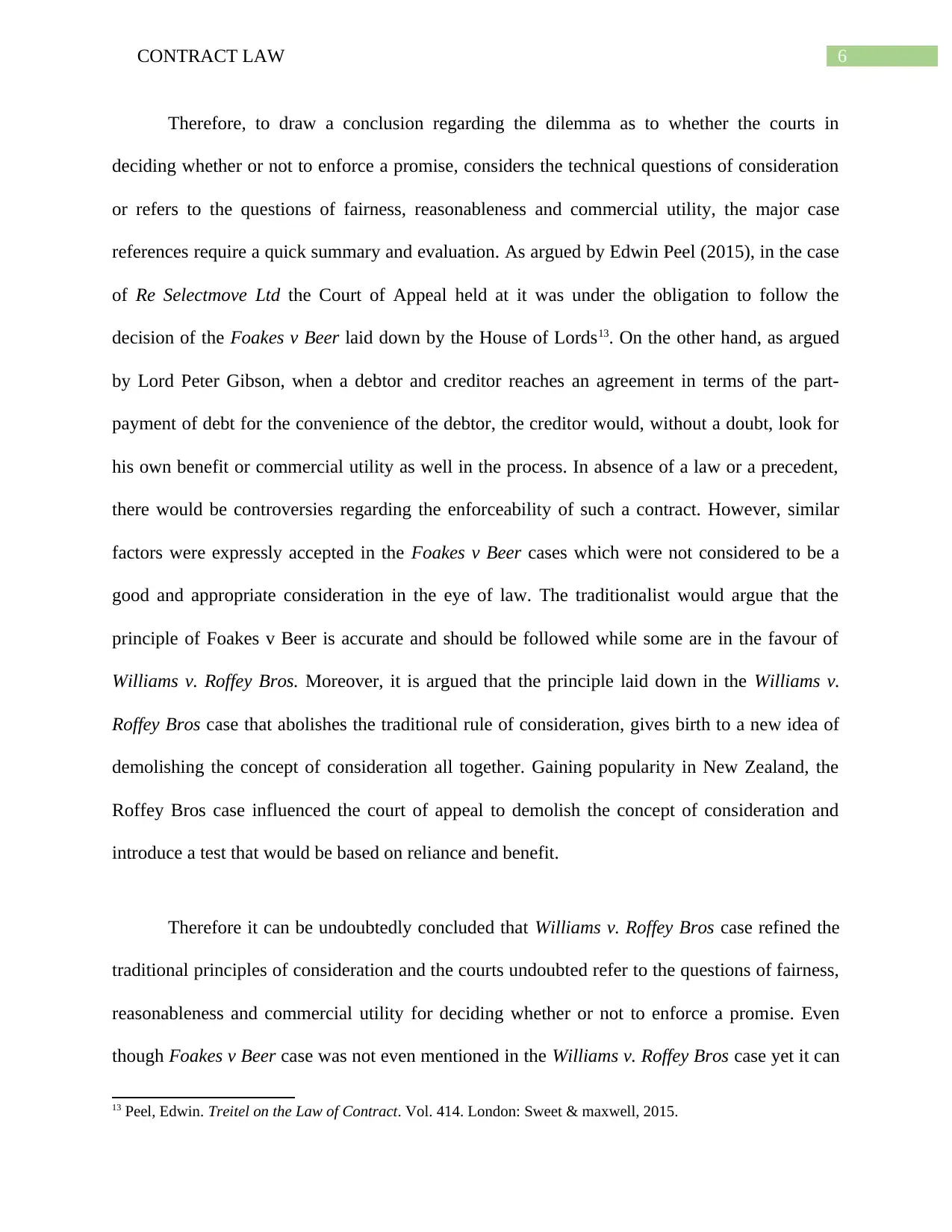
6CONTRACT LAW
Therefore, to draw a conclusion regarding the dilemma as to whether the courts in
deciding whether or not to enforce a promise, considers the technical questions of consideration
or refers to the questions of fairness, reasonableness and commercial utility, the major case
references require a quick summary and evaluation. As argued by Edwin Peel (2015), in the case
of Re Selectmove Ltd the Court of Appeal held at it was under the obligation to follow the
decision of the Foakes v Beer laid down by the House of Lords13. On the other hand, as argued
by Lord Peter Gibson, when a debtor and creditor reaches an agreement in terms of the part-
payment of debt for the convenience of the debtor, the creditor would, without a doubt, look for
his own benefit or commercial utility as well in the process. In absence of a law or a precedent,
there would be controversies regarding the enforceability of such a contract. However, similar
factors were expressly accepted in the Foakes v Beer cases which were not considered to be a
good and appropriate consideration in the eye of law. The traditionalist would argue that the
principle of Foakes v Beer is accurate and should be followed while some are in the favour of
Williams v. Roffey Bros. Moreover, it is argued that the principle laid down in the Williams v.
Roffey Bros case that abolishes the traditional rule of consideration, gives birth to a new idea of
demolishing the concept of consideration all together. Gaining popularity in New Zealand, the
Roffey Bros case influenced the court of appeal to demolish the concept of consideration and
introduce a test that would be based on reliance and benefit.
Therefore it can be undoubtedly concluded that Williams v. Roffey Bros case refined the
traditional principles of consideration and the courts undoubted refer to the questions of fairness,
reasonableness and commercial utility for deciding whether or not to enforce a promise. Even
though Foakes v Beer case was not even mentioned in the Williams v. Roffey Bros case yet it can
13 Peel, Edwin. Treitel on the Law of Contract. Vol. 414. London: Sweet & maxwell, 2015.
Therefore, to draw a conclusion regarding the dilemma as to whether the courts in
deciding whether or not to enforce a promise, considers the technical questions of consideration
or refers to the questions of fairness, reasonableness and commercial utility, the major case
references require a quick summary and evaluation. As argued by Edwin Peel (2015), in the case
of Re Selectmove Ltd the Court of Appeal held at it was under the obligation to follow the
decision of the Foakes v Beer laid down by the House of Lords13. On the other hand, as argued
by Lord Peter Gibson, when a debtor and creditor reaches an agreement in terms of the part-
payment of debt for the convenience of the debtor, the creditor would, without a doubt, look for
his own benefit or commercial utility as well in the process. In absence of a law or a precedent,
there would be controversies regarding the enforceability of such a contract. However, similar
factors were expressly accepted in the Foakes v Beer cases which were not considered to be a
good and appropriate consideration in the eye of law. The traditionalist would argue that the
principle of Foakes v Beer is accurate and should be followed while some are in the favour of
Williams v. Roffey Bros. Moreover, it is argued that the principle laid down in the Williams v.
Roffey Bros case that abolishes the traditional rule of consideration, gives birth to a new idea of
demolishing the concept of consideration all together. Gaining popularity in New Zealand, the
Roffey Bros case influenced the court of appeal to demolish the concept of consideration and
introduce a test that would be based on reliance and benefit.
Therefore it can be undoubtedly concluded that Williams v. Roffey Bros case refined the
traditional principles of consideration and the courts undoubted refer to the questions of fairness,
reasonableness and commercial utility for deciding whether or not to enforce a promise. Even
though Foakes v Beer case was not even mentioned in the Williams v. Roffey Bros case yet it can
13 Peel, Edwin. Treitel on the Law of Contract. Vol. 414. London: Sweet & maxwell, 2015.
Paraphrase This Document
Need a fresh take? Get an instant paraphrase of this document with our AI Paraphraser

7CONTRACT LAW
be seen that how two similar cases could be decided in different ways, one by following the
traditional principles while the other by deviating from the tradition.
be seen that how two similar cases could be decided in different ways, one by following the
traditional principles while the other by deviating from the tradition.
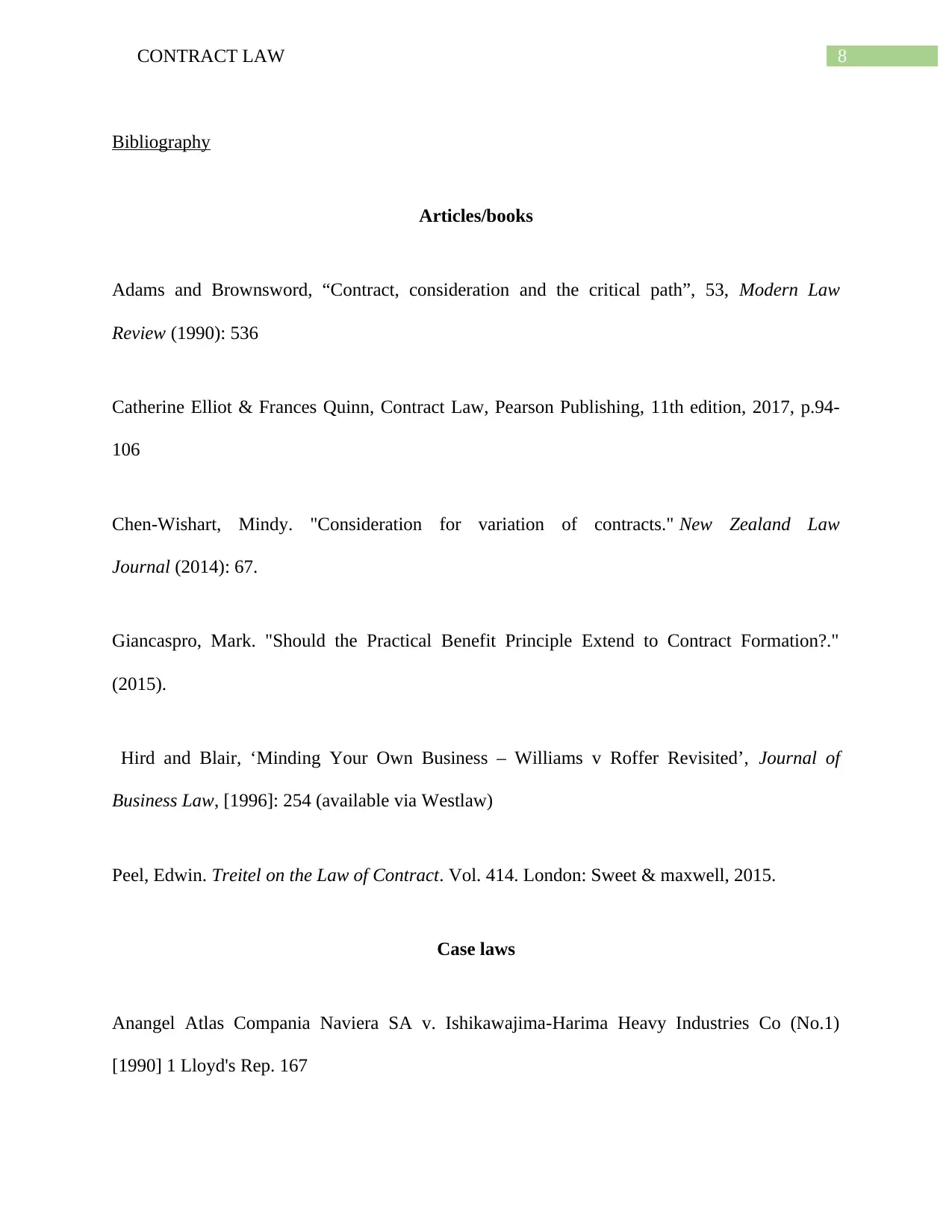
8CONTRACT LAW
Bibliography
Articles/books
Adams and Brownsword, “Contract, consideration and the critical path”, 53, Modern Law
Review (1990): 536
Catherine Elliot & Frances Quinn, Contract Law, Pearson Publishing, 11th edition, 2017, p.94-
106
Chen-Wishart, Mindy. "Consideration for variation of contracts." New Zealand Law
Journal (2014): 67.
Giancaspro, Mark. "Should the Practical Benefit Principle Extend to Contract Formation?."
(2015).
Hird and Blair, ‘Minding Your Own Business – Williams v Roffer Revisited’, Journal of
Business Law, [1996]: 254 (available via Westlaw)
Peel, Edwin. Treitel on the Law of Contract. Vol. 414. London: Sweet & maxwell, 2015.
Case laws
Anangel Atlas Compania Naviera SA v. Ishikawajima-Harima Heavy Industries Co (No.1)
[1990] 1 Lloyd's Rep. 167
Bibliography
Articles/books
Adams and Brownsword, “Contract, consideration and the critical path”, 53, Modern Law
Review (1990): 536
Catherine Elliot & Frances Quinn, Contract Law, Pearson Publishing, 11th edition, 2017, p.94-
106
Chen-Wishart, Mindy. "Consideration for variation of contracts." New Zealand Law
Journal (2014): 67.
Giancaspro, Mark. "Should the Practical Benefit Principle Extend to Contract Formation?."
(2015).
Hird and Blair, ‘Minding Your Own Business – Williams v Roffer Revisited’, Journal of
Business Law, [1996]: 254 (available via Westlaw)
Peel, Edwin. Treitel on the Law of Contract. Vol. 414. London: Sweet & maxwell, 2015.
Case laws
Anangel Atlas Compania Naviera SA v. Ishikawajima-Harima Heavy Industries Co (No.1)
[1990] 1 Lloyd's Rep. 167
⊘ This is a preview!⊘
Do you want full access?
Subscribe today to unlock all pages.

Trusted by 1+ million students worldwide
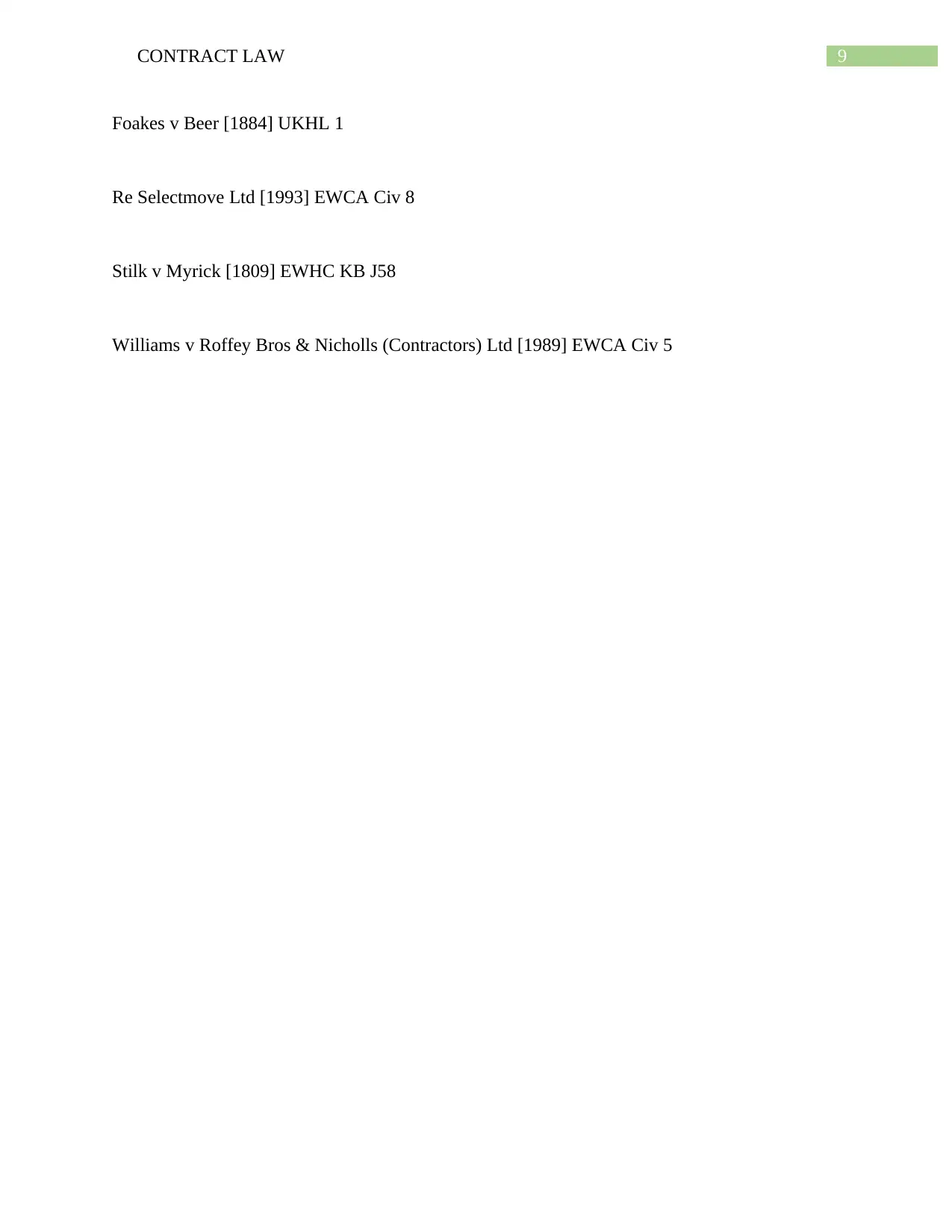
9CONTRACT LAW
Foakes v Beer [1884] UKHL 1
Re Selectmove Ltd [1993] EWCA Civ 8
Stilk v Myrick [1809] EWHC KB J58
Williams v Roffey Bros & Nicholls (Contractors) Ltd [1989] EWCA Civ 5
Foakes v Beer [1884] UKHL 1
Re Selectmove Ltd [1993] EWCA Civ 8
Stilk v Myrick [1809] EWHC KB J58
Williams v Roffey Bros & Nicholls (Contractors) Ltd [1989] EWCA Civ 5
1 out of 10
Related Documents
Your All-in-One AI-Powered Toolkit for Academic Success.
+13062052269
info@desklib.com
Available 24*7 on WhatsApp / Email
![[object Object]](/_next/static/media/star-bottom.7253800d.svg)
Unlock your academic potential
Copyright © 2020–2025 A2Z Services. All Rights Reserved. Developed and managed by ZUCOL.





